SomnusNooze
Happy Fall! If you’ve missed any of the latest news we’ve shared through our social media, don’t worry! Get up to date with this edition of “In Case You Missed It!”
- WELCOME DR. LAMMERS: Dr. Gert Jan Lammers joins the Hypersomnia Foundation’s Medical Advisory Board.
- FREE VIRTUAL CONFERENCES: Registration open for WUN, SASM, and NIH NINDS conferences.
- U.S. ADVOCACY ALERT: Ask Congress to support the rare disease community.
- STUDY PARTICIPANTS NEEDED: Study recruiting people with IH.
- WORTH SHARING: Blogger responds to NY Times article about the first FDA-approved treatment for IH.
- TREATMENT UPDATE: Once-nightly sodium oxybate shown to significantly improve symptoms of narcolepsy.
- TALKING SLEEP: Dr. Kiran Maski discusses hypersomnia treatments in AASM podcast.
Don’t worry if you’ve missed anything. We’ve got you covered!
WELCOME DR. GERT JAN LAMMERS TO THE HF MEDICAL ADVISORY BOARD!
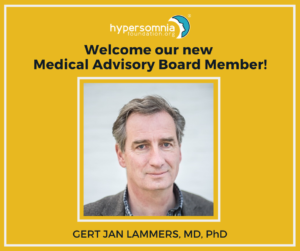 We are pleased to welcome Dr. Gert Jan Lammers as a new member of the Hypersomnia Foundation’s Medical Advisory Board.
We are pleased to welcome Dr. Gert Jan Lammers as a new member of the Hypersomnia Foundation’s Medical Advisory Board.
Dr. Lammers trained as a neurologist and clinical neurophysiologist at Leiden University Medical Center, then earned a PhD at Leiden University with a thesis titled “Narcolepsy.” He is currently a professor of neurology at Leiden University, and the primary focus of his research is on narcolepsy and related disorders of hypersomnolence. Dr. Lammers is one of the founding members of the European Narcolepsy Network, which is an organization of clinicians and researchers across all of Europe with a focus on central disorders of hypersomnolence. He also serves as the current chair of the Dutch Society for Sleep Medicine.
In May 2021, Dr. Lammers hosted a webinar for the Hypersomnia Foundation entitled, “Diagnosing Hypersomnia Differently: A European Proposal.”
To learn more about Dr. Lammers and the other distinguished members of our Medical Advisory Board visit our “Medical Advisory Board” web page.
REGISTRATION OPEN FOR THREE FREE VIRTUAL CONFERENCES
Wake Up Narcolepsy “Shared Experiences in Distant Places: Narcolepsy Support”
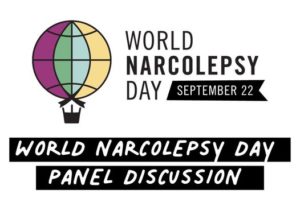 Please join Wake Up Narcolepsy and leading advocates this World Narcolepsy Day for a panel discussion entitled “Shared Experiences in Distant Places: Narcolepsy Support.” Narcolepsy exists across the world. The geopolitical landscape varies, but symptoms and journeys are remarkably similar. There will be a panel of leading voices discussing their journeys and the importance of social support. Panelists include Hypersomnia Foundation Board member, Rebecca King.
Please join Wake Up Narcolepsy and leading advocates this World Narcolepsy Day for a panel discussion entitled “Shared Experiences in Distant Places: Narcolepsy Support.” Narcolepsy exists across the world. The geopolitical landscape varies, but symptoms and journeys are remarkably similar. There will be a panel of leading voices discussing their journeys and the importance of social support. Panelists include Hypersomnia Foundation Board member, Rebecca King.
This FREE event is for people with narcolepsy and support members and will be held on World Narcolepsy Day, September 22, 2021 from 6:00-7:30 p.m. Eastern. Register HERE.
The Society of Anesthesia and Sleep Medicine (SASM) 2021 Virtual Annual Meeting “Sleep Health: The New Vital Sign”
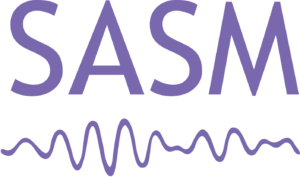 Registration is now open for the SASM Annual Meeting on October 7-8, 2021. This free virtual conference is open to patients as well as healthcare providers. Presentations and discussions tentatively scheduled are:
Registration is now open for the SASM Annual Meeting on October 7-8, 2021. This free virtual conference is open to patients as well as healthcare providers. Presentations and discussions tentatively scheduled are:
- Sleep Health and Why We Should Be Focusing on It in This Decade
- Sleep and the Pandemic
- Sleep Health: Health Care Workers
- Postoperative Complications in Obstructive Sleep Apnea
- Collaborative Guidelines on Postoperative Management of Patients with OSA
Healthcare providers can get CME for free, if they’re SASM members (small fee if they’re not members). Sessions will be recorded and available after the conference for all registrants. Register at the SASM website.
NIH NINDS HEADWAY “Health Disparities and Inequities in Neurological Disorders” Workshop
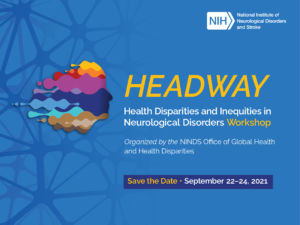 Registration is still open for the NIH NINDS HEADWAY Workshop being held virtually September 22-24, 2021 from 12:00-5:00 p.m. ET daily. This free event is open to all— including patients, caregivers, advocates, researchers, healthcare providers, industry professionals, etc.
Registration is still open for the NIH NINDS HEADWAY Workshop being held virtually September 22-24, 2021 from 12:00-5:00 p.m. ET daily. This free event is open to all— including patients, caregivers, advocates, researchers, healthcare providers, industry professionals, etc.
NIH NINDS (The U.S. National Institutes of Health’s National Institute on Neurological Disorders and Stroke) is committed to reducing the disproportionate burden of neurological disease borne by underserved groups of society, including race/ethnic, sex/gender minorities, rural, disabled and socioeconomically disadvantaged populations.
The goal of the HEADWAY workshop is to identify evidence-based interventions to diminish disparities and inequities in neurological disorders. This workshop will assemble experts in various disciplines—from clinical and health services researchers to implementation and behavioral scientists, along with community stakeholders and patient advocates. Findings and recommendations developed during this workshop will be placed on the NINDS website and used as resources for setting priorities and developing initiatives over the next 5–10 years.
Learn more about this workshop and register online by visiting our “Events” page. A detailed agenda of this event can be found HERE.
U.S. ADVOCACY ALERT! TAKE 2 QUICK ACTIONS TODAY!
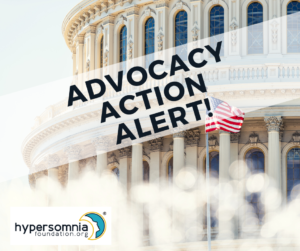 First, U.S. lawmakers are developing a $3.5 trillion legislative package that could include many healthcare policies that would help the rare disease community. We need your help! Click to email Congress to support the following five priorities and ensure they are included in the final reconciliation package:
First, U.S. lawmakers are developing a $3.5 trillion legislative package that could include many healthcare policies that would help the rare disease community. We need your help! Click to email Congress to support the following five priorities and ensure they are included in the final reconciliation package:
- Significantly increase funding for home and community-based (HCBS) services to allow more rare disease patients with disabilities to receive care in the comfort of their home instead of institutions, such as nursing homes.
- Establish and fund a national paid family and medical leave program to help give patients and their caregivers the flexibility to balance treatment and employment while dealing with their own, or a family member’s, health needs.
- Make the enhanced advance premium tax credits permanent, which were established under the American Rescue Plan, so more Americans can the afford quality, affordable health care insurance that rare disease patients depend on to treat their conditions and maintain their health.
- Fill the Medicaid gap in the 12 states that have yet to expand Medicaid adults making less than 138% of the Federal Poverty Level. There is an opportunity to help the estimated 2.2 million Americans, many of whom are likely to have a rare disease, that still need health care coverage.
- Establish out-of-pocket prescription drug caps for Medicare beneficiaries to ensure patients are able to afford the prescription drugs they need. In 2019, an estimated 1.5 million Medicare Part D beneficiaries had out-of- pocket prescription drug expenses greater than $6550.
Second, protect the U.S. Orphan Drug Tax Credit! The House Ways and Means Committee in Congress is considering the Build Back Better Act, part of which would amend the Orphan Drug Tax Credit (ODTC) in ways that would severely undercut the original goal of the 1983 Orphan Drug Act. Please reach out to your members of Congress and ask them to oppose Section 138141, which alters the ODTC in the final bill!
SURVEY SEEKING PARTICIPANTS WITH IH
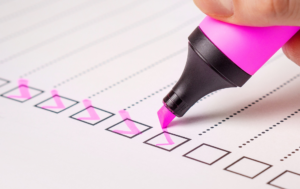 Harvard Medical School is seeking young adults (age 18-39) with idiopathic hypersomnia (IH) who live in the United States to participate in a survey study to assess the impact of IH on social functioning including friendships and romantic relationships. The study team consists of hypersomnia researchers at Beth Israel Deaconess Medical Center, including Dr. Eric Zhou and Dr. Thomas Scammell. They hope to gain a better understanding of the social lives of young adults with IH.
Harvard Medical School is seeking young adults (age 18-39) with idiopathic hypersomnia (IH) who live in the United States to participate in a survey study to assess the impact of IH on social functioning including friendships and romantic relationships. The study team consists of hypersomnia researchers at Beth Israel Deaconess Medical Center, including Dr. Eric Zhou and Dr. Thomas Scammell. They hope to gain a better understanding of the social lives of young adults with IH.
Participation is completely anonymous. The survey should take no more than 15-20 minutes to complete.
To thank you for your time, they will make a $25 donation to your choice of the following patient support and advocacy organizations after you complete the survey:
- Hypersomnia Foundation
- Narcolepsy Network
- Project Sleep
- Wake Up Narcolepsy
Take the survey HERE. If you have any questions before or at any time during the study, please feel free to contact Dr. Ryan Davidson () or Dr. Eric Zhou ().
DEAR VIRGINIA HUGHES: I’M NOT A LIAR, A DRUG ABUSER, OR A RAPIST. I’M JUST EXHAUSTED.
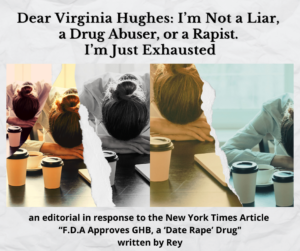 Meet Rey, a self-described “Very Tired Astrophysicist” diagnosed with idiopathic hypersomnia in 2020 at the age of 24. On her blog, she recently published a personal response to the New York Times article entitled “F.D.A Approves GHB, a ‘Date Rape’ Drug, for Rare Sleeping Disorder.”
Meet Rey, a self-described “Very Tired Astrophysicist” diagnosed with idiopathic hypersomnia in 2020 at the age of 24. On her blog, she recently published a personal response to the New York Times article entitled “F.D.A Approves GHB, a ‘Date Rape’ Drug, for Rare Sleeping Disorder.”
Rey states, “Those of us in the IH community have been eagerly watching the development of new medications, and we reacted with joy to the news that Xywav became the first FDA approved drug to treat IH. That is, until Virginia Hughes’ article for the New York Times dropped. Ms. Hughes neither respects the seriousness of our condition nor the gravity of finally having a singular FDA-approved treatment.”
Please read Rey’s article and share it with family and friends. To quote her closing statement, those suffering from IH “deserve respect and resources for the daily fight we face to finally feel rested.”
ONCE-NIGHTLY SODIUM OXYBATE SHOWN TO SIGNIFICANTLY IMPROVE SYMPTOMS OF NARCOLEPSY
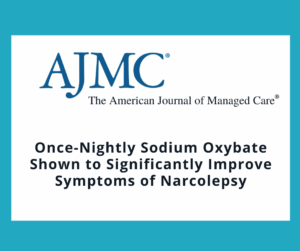 A recent article in the “American Journal of Managed Care” (AJMC) summarizes the results of the phase 3 REST-ON clinical trial of once nightly sodium oxybate in narcolepsy. The study reported significant improvement in patients with narcolepsy treated with once-nightly sodium oxybate, FT218, versus placebo.
A recent article in the “American Journal of Managed Care” (AJMC) summarizes the results of the phase 3 REST-ON clinical trial of once nightly sodium oxybate in narcolepsy. The study reported significant improvement in patients with narcolepsy treated with once-nightly sodium oxybate, FT218, versus placebo.
In assessing the pharmacologic management of narcolepsy, sodium oxybate was noted by researchers as the only drug that has demonstrated efficacy across multiple narcolepsy symptoms, including disrupted nighttime sleep and excessive daytime sleepiness (EDS).
“Once-nightly sodium oxybate is under review at the FDA for the treatment of EDS and cataplexy in adults with narcolepsy with a Prescription Drug User Fee Act date of October 15, 2021,” concluded the study authors. “If approved, FT218 may represent a major advance for patients experiencing the burdensome symptoms of narcolepsy and for physicians who manage their patients with this chronic, debilitating sleep disorder.”
Read a summary in the AJMC article and read the full paper HERE.
TALKING SLEEP: UPDATES IN THE TREATMENT OF HYPERSOMNIAS
 In a recent episode of “Talking Sleep,” a podcast of the American Academy of Sleep Medicine (AASM), Dr. Kiran Maski discusses the recently released AASM clinical practice guideline for treatment of central disorders of hypersomnolence. Dr. Maski, a member of the Hypersomnia Foundation Medical Advisory Board and Chair of the AASM Task Force that developed the guideline, talks about data-driven treatment recommendations, future research directions, the challenges of diagnosing hypersomnias, and the potential of sleep biomarkers.
In a recent episode of “Talking Sleep,” a podcast of the American Academy of Sleep Medicine (AASM), Dr. Kiran Maski discusses the recently released AASM clinical practice guideline for treatment of central disorders of hypersomnolence. Dr. Maski, a member of the Hypersomnia Foundation Medical Advisory Board and Chair of the AASM Task Force that developed the guideline, talks about data-driven treatment recommendations, future research directions, the challenges of diagnosing hypersomnias, and the potential of sleep biomarkers.
Listen to Dr. Maski in Season Three/Episode 13 of “Talking Sleep” and read the complete AASM guideline HERE.
